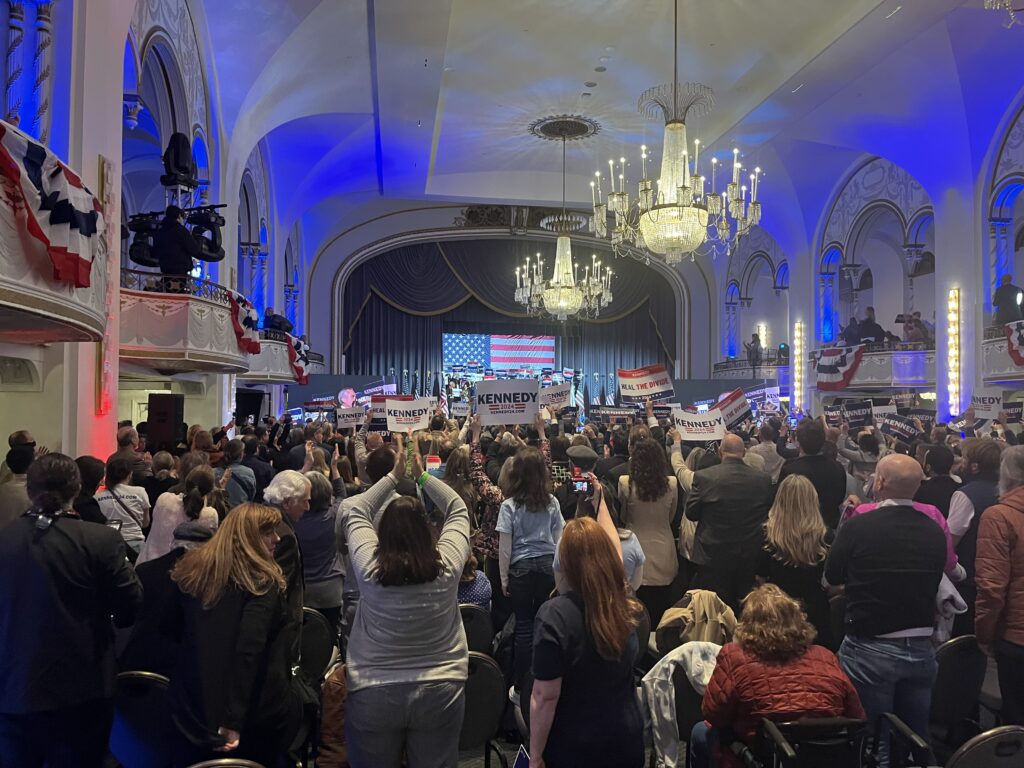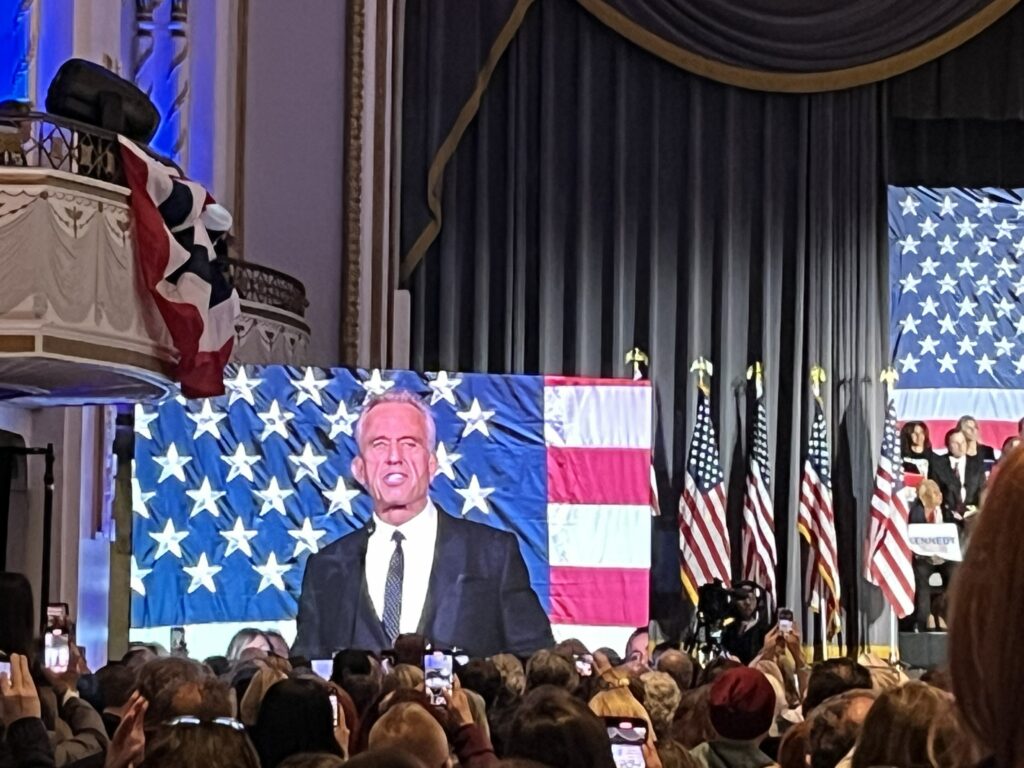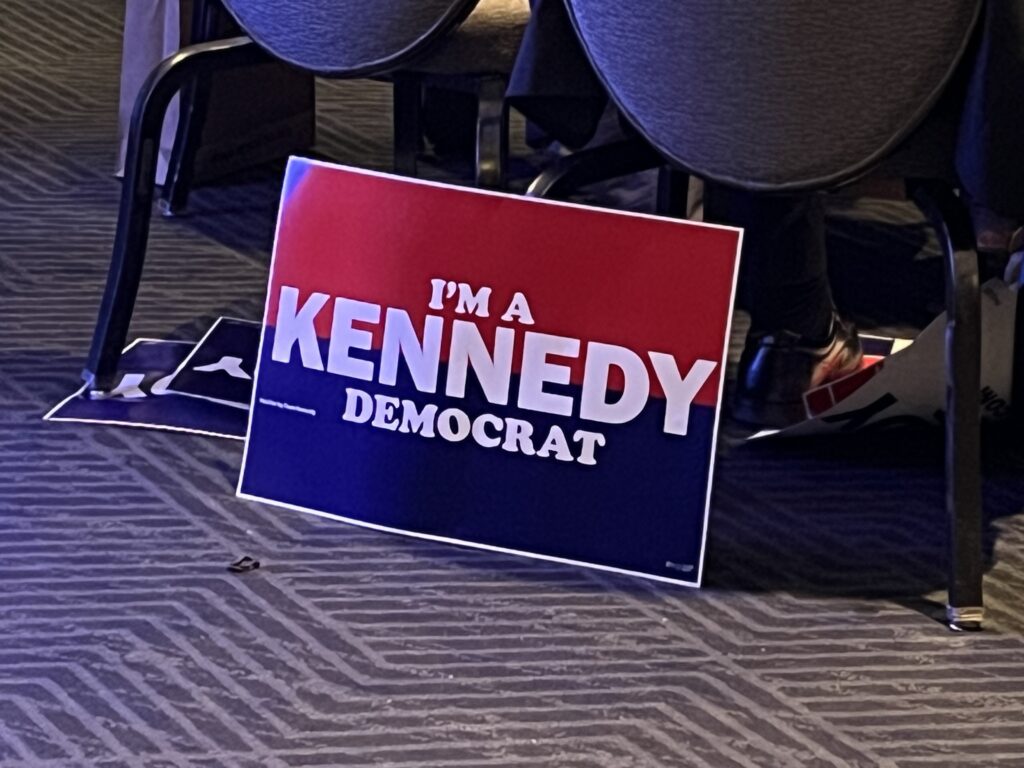RFK, Jr. Blends Progressive Populism and Talk Radio Politics in POTUS Speech

Toward the end of Robert F. Kennedy, Jr’s bravura performance in a ballroom at the Boston Park Plaza Wednesday, an alarm bell sounded and a robotic female voice announced “a report of an emergency in this building.” The crowd on hand to hear Kennedy formally declare his candidacy, some 2,000 strong, was instructed to evacuate.
After a moment of confusion, RFK, Jr. told the crowd he’d been informed that there was no emergency and he was going to press on with his speech. The bell sounded again and the demanding, automated voice repeated the call to evacuate.
“Nice try,” Kennedy quipped. He wasn’t going anywhere.
And the crowd went wild.
That was the message Kennedy and his team came to Boston to deliver: Joe Biden may want to ignore him, and some Democrats — including in his own family — may be embarrassed by him, and the media may hate him. But RFK, Jr. is going to run for president, and he’s going to run like he means it.
Because he does.
Watching him deliver a smart, carefully calibrated speech — the word “vaccine” never crossed his lips — a scene from the movie Rocky came to mind. After Rocky landed some serious blows, Apollo Creed’s trainer tells the champ who’s still not taking the challenger seriously, “He doesn’t know it’s supposed to be a show. He thinks it’s a damn fight!”

A crowd of some 2,000 people turned out for RFK, Jr.’s announcement that he’s running for POTUS in 2024.
Kennedy embraced the longshot nature of his candidacy, comparing his 2024 quest to the campaign his father was running in 1968 before an assassin’s bullet brought it to an end. In RFK, Jr’s telling, the situation his father faced was much like his today: running against an incumbent Democrat in the White House, a time of “unprecedented polarization,” and “the liberal press were all against him.”
Kennedy’s campaign isn’t shy about wrapping him in the Camelot history of his political family. The setting for his announcement — an old-school Boston ballroom with chandeliers overhead, patriotic bunting on the balconies and a brass band playing Aaron Copeland — was straight out of a Ken Burns documentary. And just to make sure the point wasn’t missed, family photos of RFK, Jr. and his famous forebears flashed on flat-panel TV screens at the front of the room.
Kennedy’s political message was an NPR version of Bernie Sanders’ left-wing economic populism, but with a dollop of talk-radio conspiracy theory thrown in. While Liz Warren Democrats rail against Big Business, Big Pharma, etc., RFK, Jr. adds includes Big Government — his opposition to “the corrupt merger of state and corporate power.”
“My mission…will be to end the corrupt merger of state and corporate power that is threatening to impose a new corporate feudalism on our country, to poison our children and our people with chemicals and pharmaceutical drugs, to strip mine our asset, to hollow the middle class and keep us in a constant state of war,” Kennedy said.
These themes took RFK, Jr. to a variety of topics, from his environmental activism to his views on the COVID-19 lockdowns to his questions about America’s support for Ukraine. And he wasn’t in any hurry to wrap up. After about 50 minutes, Kennedy warned the crowd that he was only halfway through his speech.

“This is what happens when you censor somebody for 18 years,” Kennedy said. “I’ve got a lot to talk about. They shouldn’t have shut me up that long. Now I’m going to really let loose on them for the next 18 months.”
When he “let loose” on lockdowns, denouncing public health officials for a failed policy and decrying the damage they inflicted on small businesses and low-income communities, Kennedy sounded like a caller to a conservative radio talk show.
When he attacked the “corporate media” and its “lies,” he sounded like a talk radio host.
“The media is at its lowest point because we know the media lies to us — everybody knows that,” Kennedy said to cheers — a scene that could have come straight out of a Trump rally. “And when the media and the corporate media and the corporate-captive government see other voices of truth, they have to brand those misinformation.
“They either have to censor us, or they have to lie about what’s true and what’s not true.”
Kennedy even had a few kind words for Trump, saying that the former president’s instincts on the lockdown were right. While he blamed Trump for the national lockdown policy, he added, “in fairness, President Trump will say ‘the lockdown wasn’t my idea, the bureaucrats rolled me. I said we shouldn’t do it.’
“But that’s not a good excuse. He was the President of the United States.”
The elephant in the room was the vaccine issue, which Kennedy never mentioned by name. He did, however, extensively discuss his theory that something happened in 1989 that unleashed an epidemic of neurological and auto-immune disease upon the land, including autism. “Why aren’t we asking the question, ‘What happened?’”
 In the past, his answer would have been “vaccine public health policy.” On Wednesday, however, he left the question unanswered, merely noting “There’s a limited number of culprits, or chemical toxins that became ubiquitous in 1989.”
In the past, his answer would have been “vaccine public health policy.” On Wednesday, however, he left the question unanswered, merely noting “There’s a limited number of culprits, or chemical toxins that became ubiquitous in 1989.”
The fact that Kennedy has toned down his anti-vaccine talk is a sign he’s taking this campaign seriously. The fact that 2,000 people from across the northeast and beyond — one man brought his daughter to the announcement from North Carolina — shows he has supporters who are taking it seriously, too.
“Far better than I expected, miles better,” said Chris Bartle from Dover, Mass., after the speech. “I think he was trying to rope people in, reaching for a wider audience. He’s got a Democratic form of populism, informed by the 1968 campaign.”
“It was exciting. He’s what the country needs, and you saw the reaction of the crowd. It was awesome,” said Rita, who was in from Missouri. “He wants to hold corporations responsible for the damage they are doing, particularly to our children. And he wants to help build up the middle class.”
Father Jeff Langan, a Roman Catholic chaplain from the parish next to Harvard University, said he came to the announcement because “I think there is a need for leadership in this country that respects human dignity.” And, added Langan, a former political science professor, “There’s a lot of buzz around Harvard about RFK, Jr., even among the Catholic students.”
It shouldn’t be a surprise. In the world of politics, name ID plus money plus issues that energize your base is considered a recipe for a strong campaign, and Kennedy has all three.
If he puts them all to good use, he could create some real problems for President Joe Biden. Particularly in an early primary state just 30 minutes north of that crowded Boston ballroom.


